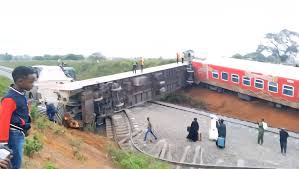The Nigerian Railway Corporation (NRC) has revised its casualty figure from the recent Abuja-Kaduna train derailment, confirming that 20 passengers sustained injuries, contrary to its earlier report of seven. The derailment occurred last Tuesday between Kubwa and Asham stations, with 583 passengers and crew members on board.
NRC’s Managing Director, Dr. Kayode Opeifa, disclosed the update while giving an account of ongoing recovery efforts. He said engineers have made notable progress in salvaging the derailed train. As of September 2, one locomotive and four coaches had been successfully recovered and transferred to Idu Station for technical inspection. According to him, this was made possible with the construction of a temporary 100-metre bypass track that enabled retrieval and movement of the damaged coaches.
Opeifa explained that work was ongoing at the site to extract the remaining locomotive and four coaches involved in the incident. He assured passengers and the public that the corporation was committed to restoring operations in the shortest possible time. “Passenger safety and service reliability remain the corporation’s topmost priorities,” he said. “Every necessary measure is being taken to restore full train operations as quickly as possible.”
To assist passengers and their families, the NRC has set up an Incident Desk to provide information and support. According to the corporation, 510 out of the 583 names listed on the passenger manifest have already been contacted. Three dedicated phone lines were also released for inquiries: Queen – 07036452228, Lilian – 07031993211, and Abubakar – 08036593212.
Opeifa expressed gratitude to security agencies for their swift response at the accident scene and thanked the media for what he described as timely and accurate coverage. He also acknowledged the Minister of Transportation, Senator Saidu Alkali, for visiting the derailment site and commending the ongoing recovery efforts.
The derailment has once again raised concerns about safety on Nigeria’s railways. The Abuja-Kaduna corridor, in particular, is one of the busiest routes in the country and has been subject to safety concerns in the past. While the latest incident recorded no fatalities, the injuries sustained and the temporary disruption of services have left many passengers worried.
Rail analysts noted that the NRC’s decision to revise its casualty figure highlights the challenges of providing accurate information in the immediate aftermath of accidents. They urged the corporation to strengthen its crisis communication strategy to ensure that updates are timely and credible. This, they said, would help prevent misinformation and reassure passengers about the corporation’s commitment to transparency.
Beyond recovery, experts also stressed the need for the NRC to invest in modern safety systems, regular track maintenance, and improved monitoring technologies. According to them, incidents like derailments can often be linked to infrastructure gaps that require long-term investments and careful oversight.
For many passengers, the Abuja-Kaduna train remains a vital alternative to the road, which has over the years been plagued by bandit attacks and accidents. The rail service is considered safer and faster, but incidents such as derailments risk eroding public confidence in its reliability.
The NRC has, however, reiterated its assurance that safety remains its top priority. The corporation said it was working with the Nigeria Safety Investigation Bureau (NSIB), which is currently leading an independent investigation into the derailment. NSIB had earlier announced that its final report would be submitted by September 25, 2025.
Stakeholders believe the collaboration between the NRC and NSIB will be crucial in identifying the root causes of the derailment and preventing similar occurrences in the future. While recovery operations are ongoing, the corporation said its goal is not just to bring operations back to normal but also to strengthen safety measures across the railway network.
As Nigerians await the resumption of services on the Abuja-Kaduna corridor, the hope is that the lessons from the derailment will lead to improvements that make rail travel safer and more reliable.
